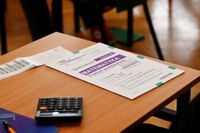On May 6, 2025, the Matura exam in mathematics at the basic level took place, marking a significant milestone for approximately 275,000 graduates from general high schools, technical schools, and Stage II vocational schools across Poland. This year's cohort is particularly notable as they are the first to sit for the exams based on the newly defined core curriculum, which has been reduced by 20 percent compared to previous years.
The Central Examination Board (CKE) is set to publish the exam papers after 2:00 PM on the same day, allowing students and educators to review the specific tasks that challenged this year's candidates. The exam format requires students to complete three mandatory written exams at the basic level: Polish, mathematics, and a foreign language, along with two oral exams in Polish and a foreign language. Additionally, students must take one written exam at an advanced level, with the option to choose from various subjects including biology, chemistry, history, and more.
The written exam session is scheduled to last until May 22, 2025, while oral exams are set for May 9 to May 24, 2025. To successfully pass the Matura exam, students need to achieve a minimum of 30 percent of the points from the mandatory exams. Those unable to take the exams in May due to unforeseen circumstances can participate in an additional session in June, with written exams from June 3 to June 17 and oral exams from June 9 to June 11. The CKE will announce the results of this year's Matura exams on July 8, 2025.
In Wrocław, 240 students from High School No. XIII participated in the mathematics exam, with many expressing confidence in their performance. "I didn’t expect the Matura to be this easy," said one student, Adrian Mikołajczyk, who had prepared in an extended mathematics program. He mentioned that while he found the exam manageable, a few questions posed challenges, particularly one involving budget calculations.
Students reported that the exam primarily featured tasks related to functions, including a problem involving a cone and a canonical form. In one of the last tasks, they were required to derive the total area function. Another student, Szymon, shared his experience, noting that the hardest part was an open-ended question that required demonstrating divisibility by 4. He expressed hope for a good score, reflecting the general optimism among his peers.
Stanisław Chwaliński, a student from II Liceum Ogólnokształcącego im. Hetmana Jana Zamojskiego in Lublin, completed the exam in just 45 minutes, labeling it as easy. He pointed out, however, that one of the tasks seemed more suited for the advanced level rather than the basic one. "I can’t imagine how anyone could fail this exam," he remarked, emphasizing the support tools available, such as calculators and formula sheets.
Dominik, also a student aiming for the advanced mathematics exam, found some aspects of the test surprisingly challenging, especially the optimization task involving a cuboid. He explained that the task required calculating the dimensions for maximum surface area, which he felt was more complex than typical basic level questions. He acknowledged that while achieving the minimum passing score of 30 percent would be straightforward, scoring above 80 percent would be a significant challenge.
As the exam unfolded, students reported a mix of confidence and anxiety. Marysia, who completed the exam in about two hours, found some of the tasks convoluted and expressed doubts about her performance. She noted that while she felt prepared, the complexity of certain questions left her uncertain about her results.
The mathematics exam at the basic level lasts 180 minutes and comprises between 27 and 39 questions, with a mix of closed-ended and open-ended formats. Students can earn a total of 50 points, with half from the closed-ended section and the other half from open-ended tasks. The closed-ended questions include multiple-choice, true/false, and matching types, while the open-ended questions require students to formulate their own answers.
In total, the CKE prepared 622 different types of exam papers and 117 types of discs for various subjects, ensuring accessibility for all students, including those with disabilities and Ukrainian citizens. As the exam period progresses, the anticipation builds for the results that will be announced on July 8, 2025. Students who do not pass any of the mandatory exams have the opportunity to retake them during a scheduled session in August.
Overall, the Matura 2025 mathematics exam has sparked discussions among students about the perceived difficulty of the tasks and their preparedness. With a range of experiences shared, it’s clear that this year's exam has left a lasting impression on the future of these young scholars as they prepare for the next steps in their educational journeys.

